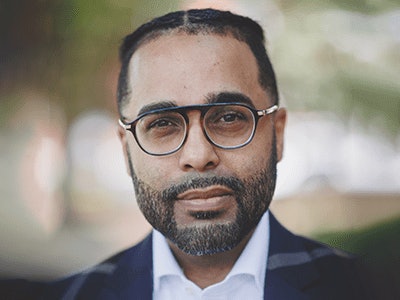The United Negro College Fund’s (UNCF) Institute for Capacity Building (ICB) is leveraging the power of networks, technology and innovation to help Historically Black Colleges and Universities (HBCUs) and Predominantly Black Institutions (PBIs) achieve their missions.
 Ed Smith-Lewis
Ed Smith-Lewis
In 2015, UNCF received a $50 million grant from the Lilly Endowment Inc. to launch the Career Pathways Initiative (CPI), a 7-year initiative designed to support graduates of Black colleges and universities embark on meaningful careers in their chosen fields.
CPI grew into a network of 24 institutional partners made up of 23 HBCUs and one PBI, known collectively as “The CPI 24.” The group used three key strategies to guide their knowledge exchange and partnership: guided pathways, curricular enhancements and integrated co-curricular engagement.
Dr. Pamela Richardson Wilks, former provost and executive vice president at Paine College and newly named president of Clinton College, began engaging with CPI in 2016 while serving at various UNCF member institutions. During her tenure at Wilberforce University, a CPI partner, the school received a $1 million CPI grant to support student career programming.
“We had an overwhelming majority of our students who were gainfully employed when they walked across the stage because they had anywhere from two to three years of experience with internships,” says Richardson in an interview with Diverse. “We began to see a large number of our students be employed as a result of the program.”
The success was due in part to the interinstitutional collaboration fostered by CPI.
“At the Institute for Capacity Building, we see virtual networks and strategic collaboration as tools to expand opportunity, reduce institutional isolation, and build meaningful bridges between colleges, employers, and communities,” says Smith-Lewis.
ICB prioritized shared digital infrastructure, faculty innovation and industry partnership to develop valuable and accessible career pathways for students.
Because of CPI, institutions could say, ‘Hey, I may not necessarily have the economic resources to facilitate what it is that I'm trying to do, but through this collaborative effort, I can actually achieve something that I would not have necessarily been able to achieve had I not had those resources available,’” says Richardson.
Nearly 10 years after the groundbreaking investment that launched CPI, UNCF continues to invest in digital innovation, career-aligned learning, and interinstitutional student support. In fall 2024, UNCF and six partner HBCUs launched HBCUv, a digital learning and community engagement platform designed for HBCUs.
“We imagine a future where all HBCUs will be engaged in online learning, sharing courses, and offering alternative credentials and pathways to create a pipeline to the global workforce,” says Dr. Nicole Pride, UNCF program performance officer and HBCUv lead. “We also envision this shared service will undergird the goals our institutions share to help increase efficiencies, improved processes, and enhanced brand perception.”
During the HBCUv pilot, 400 student and faculty accounts were created on the platform from 5 participating institutions. In the next phase of HBCUv, UNCF will help HBCUs adapt to today’s digital, educational, and economic landscape while preserving their unique mission and identity.
“This is a first-of-its-kind platform that has leading digital technologies that will address the critical need for responsive designs that are specific to the HBCU context and all the students they serve,” says Pride. “This technology will also play a critical role in facilitating key defining HBCUv characteristics like the opportunity for mobility and guidance through My Path and a centralized resource hub on HBCUv for scholarships, financial assistance, emergency aid, career planning, social services and health and well-being support.”
Over the next decade, the Institute for Capacity Building hopes to expand their reach to all 102 HBCUs and 64 PBIs and meet the critical moment of empowering a new era of Black colleges and universities.
“We’re doing this not just through HBCUv, but also by expanding access to our transformation support network, deepening engagement through shared services, and amplifying institutional voices at national platforms like UNITE,” says Smith-Lewis.
Uplifting HBCUs’ longtime legacy for serving as engines of mobility, UNCF is helping these institutions evolve to meet student needs the way they always have–through innovation and collaboration.
“Initiatives like HBCUv and CPI build on that legacy, showing how forward-looking, student-centered strategies can expand access, improve quality, and create more equitable outcomes,” says Smith-Lewis. “In doing so, they not only strengthen HBCUs, but offer a compelling model for how higher education can rise to meet the moment—for all students.”


















